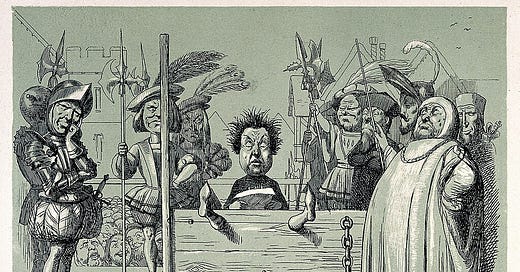Spence!
Hope you had a fabulous fourth. For me, it was good just to take a few days off without writing anything. I read, went to the movies, thanked God I’m American, and played the video game you got me for Father’s Day.
So where were we? Working off your essay, we were discussing what you might call “natural morality,” the morality that seems built into the system.
One of my favorite lines in modern entertainment was spoken by Henry Cavill playing Charles Brandon in the series The Tudors. He says: "Praise the God of all, drink the wine, and let the world be the world." There’s a great deal of wisdom in this. Indeed, I could make the argument that it is core Christianity. The Jesus who spread Jewish monotheism to the gentiles, who changed water to wine, and who said, “In the world you will have trouble,” would not have disagreed with it as a starting point. In my reading of the Gospels, he was not at all like those Christians who occasionally sink into constraining moralism and sexual prissiness. It’s just not there in the Gospel texts.
In fact, if there’s an argument that the Enlightenment breakaway from church power was a positive development, it is this. The Enlightenment’s great political and economic innovations had to do with harnessing human nature rather than trying to quash it. This is true of capitalism especially.
In the Wall Street Journal last week, Matthew Hennessey argued that socialism spreads misery precisely because it is “incompatible with human nature. People are driven to build, to invest, to strive and be productive, to pursue their own families’ well-being above all.” This is certainly true. Also, socialism is inherently authoritarian. It stipulates that, like a slave, you will work, but someone more powerful than you will distribute the money you earn as he sees fit. This is immoral.
But is capitalism moral in itself? Hennessey says yes. “Markets enable willing and mutually beneficial exchange among free people. They abominate coercion. They encourage a belief that tomorrow will be better than today.”
I disagree. Yes, freedom “enables” morality. Only morality freely chosen is truly moral, so without freedom, there can be no morality. But freedom is not itself moral, nor are free markets. Prostitution is capitalism. So is drug-dealing. So is abandoning the town that depends on you in order to make higher profits in Mexico. All this is freely chosen immorality.
So while morality begins with acknowledging and harnessing what is built into God-created nature, it doesn’t necessarily end there. Nor can it necessarily be found in a rule book that assumes that what is good for all is good for each. What we condemn in a society is sometimes right for the individual.
My response to this genuine conundrum is hierarchy and grace: the frank admission that some actions are better than others, and the frank acknowledgement that each person is a path unto himself.
More later.
Welcome back. Dad





In my own experience I feel like Jesus took natural morality combined with the message of love and helped shape it and bring it into our hearts. One of my favorite sculptures is The Ecstasy of St Teresa by Bernini. It continues to blow my mind and remind me that God isn’t a tame withdrawn Being but a whirlwind of ecstatic love.
I think you need to clarify a little. It sounds a lot to me like you are suggesting that everyone needs to " live his own truth" god's plan inherently offers sacrifice and change. Maybe you are saying this is a personal relationship between God and the individual so we don't need to judge where others are? Christ came to show us how to be in the world but also to lift a standard and it does include overcoming the natural world.??